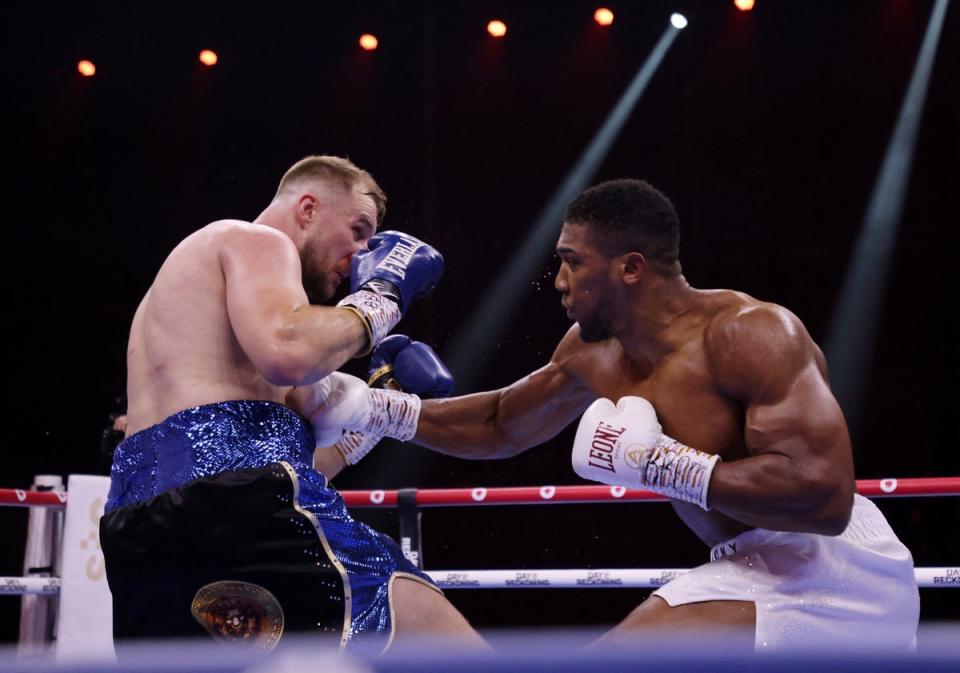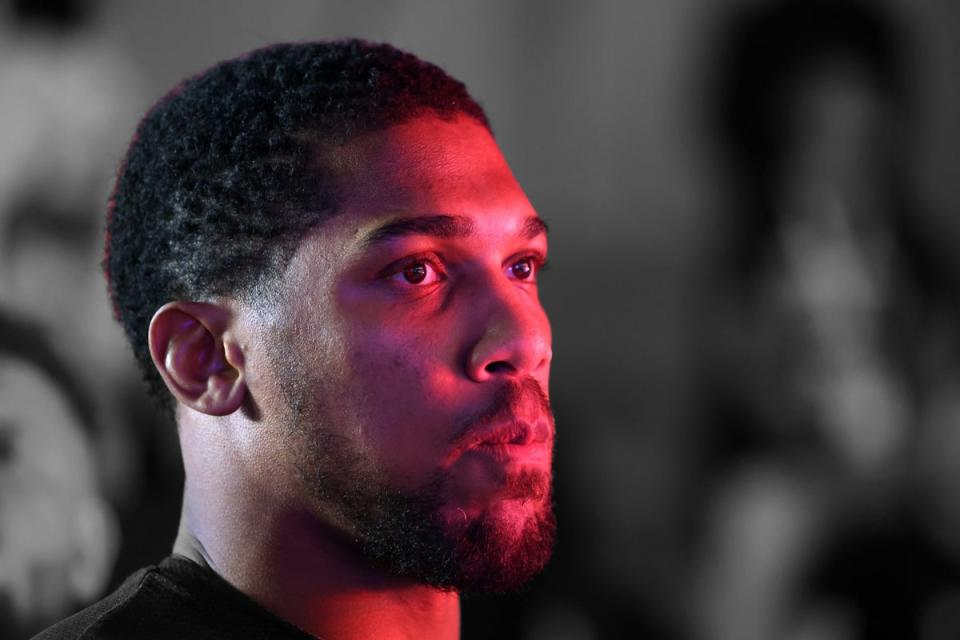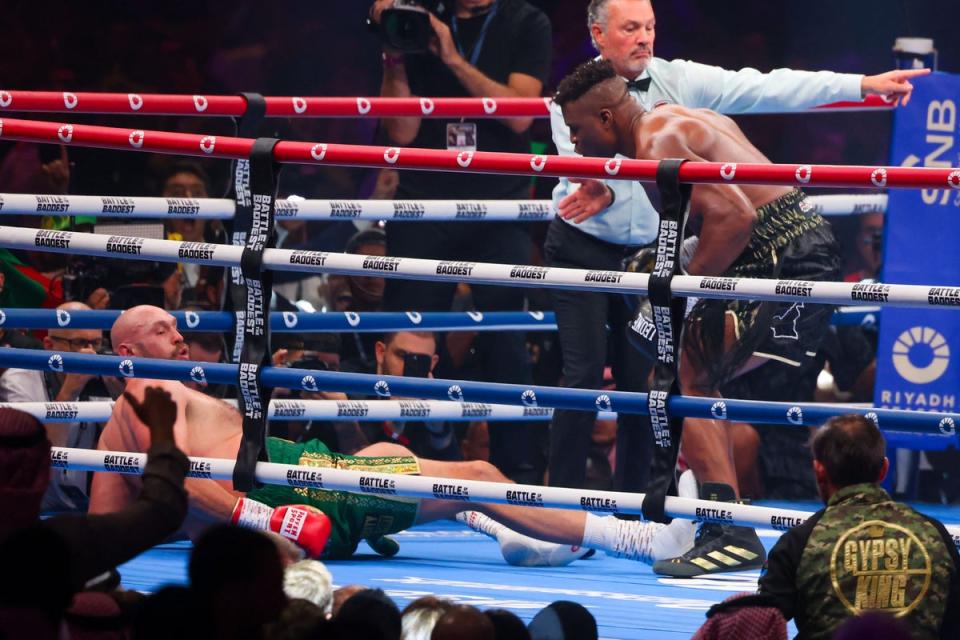Why fear will settle Anthony Joshua and Francis Ngannou’s dangerous fight
It is remarkable how quickly perceptions can change in fight sports. Before Francis Ngannou’s carnivalesque contest against Tyson Fury in October, as it was framed, there was no real question of whether the ex-UFC champion could succeed; it was a thought that very few pundits bothered to entertain, and understandably so. Here was a total boxing novice, with not even an amateur bout to his name, taking on the unbeaten WBC heavyweight champion of the world in the boxer’s preferred discipline.
Yet when Ngannou sent Fury cascading in the third round, clipping the Briton with a hook to the top of the dome before standing over him in a fit of laughter, perceptions shifted in a matter of milliseconds. The look of sheer shock on Fury's face was mirrored by the thousands watching at home and the hundreds ringside in Riyadh. Ngannou, ultimately, was denied an inconceivable victory on the disputable scorecards, but the Cameroonian left Saudi Arabia having secured a moral triumph from the moment that Fury’s 6ft 7in frame connected with the canvas in the Kingdom Arena.
Now, the mixed martial artist returns to Saudi Arabia and finds himself in a position where a literal victory over Anthony Joshua on Friday is far from inconceivable. Is a win unlikely? Of course. But styles make fights, and on paper – where fights are famously never won – Joshua seems a more conquerable conquest for Ngannou than Fury was.
The expectation in October was that Fury would keep Ngannou at arm’s length – and his are long arms – and box in a risk-averse, methodical manner until the point at which he’d decide to put an end to the fun. That moment, fans felt, would simply arrive whenever Fury dictated. That realistic prediction proved to be a far cry from reality itself, as Fury simply hung in the pocket too long and was made to pay for it.
Joshua’s famed seek-and-destroy approach has faltered in recent years, stifled and stymied by the evasiveness and versatility of Oleksandr Usyk in a pair of fights that left a lingering effect on “AJ”. Yet, against Otto Wallin in December, when the Briton cruised to a fifth-round TKO of his old sparring partner and amateur foe, Joshua looked like the unified world champion that he was twice before.

The challenge against Ngannou this week, therefore, will be striking a balance when it comes to actually striking the Cameroonian. Joshua, 34, theoretically has a greater chance of quickly dispatching Ngannou, 37, than Fury did. However, many would also argue that AJ has a greater chance of succumbing to Ngannou’s career-making, life-changing power.
Joshua, in his first fight under Fury’s former coach Ben Davison, looked more confident in his tactics in December, but if the tentativeness from his preceding bouts creeps through, it could be a costly issue. Joshua’s distance management is not as renowned as that of Fury, but he must try to pick his moments wisely when closing range against Ngannou, and when he does so he must commit – while staying alert and mobile enough to not linger where Fury was punished. It is an area where Joshua himself was punished against Andy Ruiz Jr in their first clash.

Another potential concern for Joshua is that, while his knockout ability undoubtedly eclipses Fury’s, Ngannou proved utterly unfazed by Fury’s offence. The “Predator” was even apathetic to a stray elbow that landed clean for Fury, who momentarily did his best impression of a mixed martial artist. It was a visual almost as shocking as the knockdown itself.
Between Ngannou’s power, resilience, and a distinct lack of pressure, there is more than enough to suggest that Friday could be a dangerous night for Joshua. The Briton’s experience across 12 rounds at the highest level, however, may prove crucial; Friday’s main event is scheduled for 10 rounds, but Ngannou did require a second wind of sorts to finish strong against Fury, whereas Joshua’s knockout power has carried late in fights before. Joshua got rid of Kubrat Pulev in the ninth round, Carlos Takam in the 10th, and famously Wladimir Klitschko in the 11th.

The narrative preceding Fury vs Ngannou was that the latter would require a stunning, early shot to win, or that Fury would succeed later in the fight. On Friday, it may be a matter of who wakes up in the “white room” first, as Ngannou put it to The Independent and other reporters in January. “If I catch him, then he’s going to sleep,” the Cameroonian said.
“You should keep your chin away [...] If you put your chin in the right position and get hit, even by the lightest fighters, then you might wake up in the white room. So, you better keep your chin away and fight smart. It is not chin-testing, it is a combat sport.”
Admittedly, Ngannou’s warning was as much to himself as it was to Joshua. For fans, this Friday should be fun. But the fighters? They should both be a little afraid.

 Yahoo News
Yahoo News 
